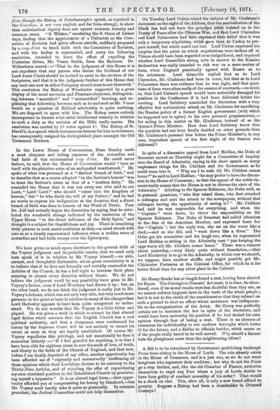In the Lower House of Convocation, Dean Stanley made a
most eloquent and telling exposure of the cowardice and bad faith of this ecclesiastical coup d'e'tat. He could never believe, he said, that the House of Convocation would " turn on itself with the plaintive noise of an antiquated weathercock." He spoke of what was proposed as a " distinct breach of faith," and to describe that as a course adopted "in the Saviour's honour" was to treat the Saviour's name as that of a " heathen deity." He reminded the House that it was not every one who said to our Lord, " Lord ! Lord!" who should " enter into the kingdom of heaven," but " he who doeth the will of my Father ;" and he bad no words to express his indignation at the doctrine that a direct breach of faith was done in honour of the Word of Truth. Poor Dr. Jelf had actually begun the discussion by saying that he attri- buted the wonderful change indicated by the resolution of the Upper House " to the direct influence of the Holy Spirit," and thought it a subject for thankfulness and joy. There is something truly piteous in such moral confusion as that,—a mind struck with awe as at a clearly supernatural influence when a sudden wave of cowardice and bad faith sweeps over the Episcopacy.


































 Previous page
Previous page